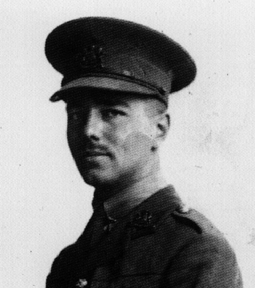An Antiwar War Movie
At the beginning of the film, a German professor urges his students to fight for their fatherland with this line from anicent Rome: Dulce et decorum est pro patria mori. "You still think it's beautiful to die for your country," says the main character meeting his professor years later. "The first bombardment taught us better. When it comes to dying for country, it's better not to die at all."
The English apparently used this line to rouse their boys to the War to End All Wars as well, as evidenced by this poem by Wilfred Owen (1893-1918), who died seven days before the Armistice:
This story is neither an accusation nor a confession, and least of all an adventure, for death is not an adventure to those who stand face to face with it. It will try simply to tell of a generation of men who, even though they may have escaped its shells, were destroyed by the war...
Well, how do they start a war?
Well, one country offends another...
How could one country offend another? You mean there's a mountain in Germany gets mad at a field over in France?
Well, stupid, one people offends another.
Oh, if that's it, I shouldn't be here at all. I don't feel offended.
At the beginning of the film, a German professor urges his students to fight for their fatherland with this line from anicent Rome: Dulce et decorum est pro patria mori. "You still think it's beautiful to die for your country," says the main character meeting his professor years later. "The first bombardment taught us better. When it comes to dying for country, it's better not to die at all."
The English apparently used this line to rouse their boys to the War to End All Wars as well, as evidenced by this poem by Wilfred Owen (1893-1918), who died seven days before the Armistice:

Dulce Et Decorum Est






 Redeemed by Our Savior, I work out my salvation with fear and trembling in Pohang, South Korea, where I live with my wife, daughter, and son and teach English at a science and technology university. Baptized a Methodist and raised a Missouri Synod Lutheran in Buffalo, NY, I spent six years as a guest of the Anglican Communion before being received by the Grace of God into the One Holy Catholic and Apostolic Church on the Feast of Saint Andrew, my patron, anno domini 2002.
Redeemed by Our Savior, I work out my salvation with fear and trembling in Pohang, South Korea, where I live with my wife, daughter, and son and teach English at a science and technology university. Baptized a Methodist and raised a Missouri Synod Lutheran in Buffalo, NY, I spent six years as a guest of the Anglican Communion before being received by the Grace of God into the One Holy Catholic and Apostolic Church on the Feast of Saint Andrew, my patron, anno domini 2002.








<< Home